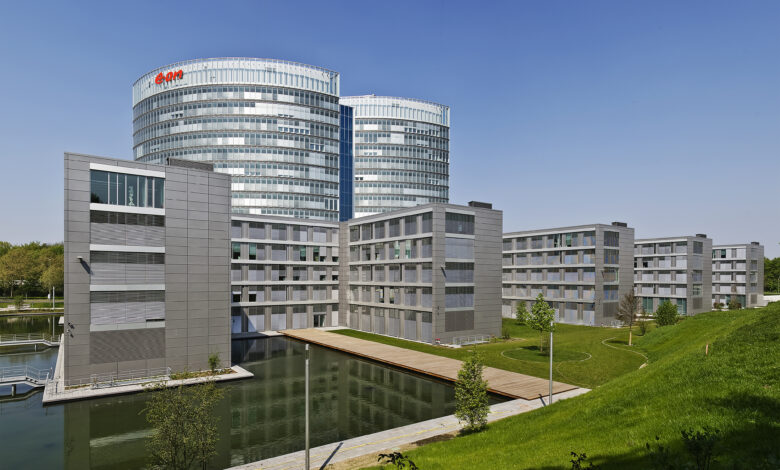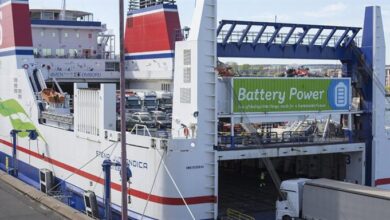Driving the electrification of commercial vehicles: E.ON gears up for the future e-transport market

The energy company E.ON is focusing on the future market of e-transport. With the aim of significantly expanding its business with products, technologies and services for electric commercial vehicle fleets, E.ON has bundled its existing activities in a new organizational unit. By 2025, E.ON’s e-mobility offering for electric charging of commercial vehicles is to be expanded to become the market leader in Europe under the name E.ON Drive eTransport.
Battery-powered commercial vehicles are still the exception. In contrast to the passenger car market, the transport sector today is only at the beginning of its development towards emission-free mobility. But the interest of companies and municipalities in electrifying their fleets is growing. In view of the climate targets, increasing freight transport and the growth of electric drives in local and long-distance public transport, the challenges of charging infrastructure, land use and grid connection are also becoming increasingly demanding.
“It is clear that the EU can only achieve its climate targets if CO2 emissions in transport are drastically reduced. This is where great levers for climate protection lie. Electric drives will therefore also gain considerably in importance in the commercial vehicle sector,” says Patrick Lammers, COO Commercial at E.ON. “Charging solutions and integrated mobility and energy concepts are a core competence of E.ON. With our new positioning, we want to become the leading provider of integrated energy and charging solutions for electric commercial vehicles in Europe in the future. In this way, we will make the vision of sustainable transport a reality together with cities, municipalities and companies.”
E.ON is now setting the course for a leading role in the e-transport market. The business with sustainable mobility solutions for the electrification of freight and local passenger transport is not new to the company. Since 2016, E.ON has been implementing corresponding projects and charging solutions for van, truck and bus fleets in Europe. The aim is to further advance electrification as a key factor for sustainable supply chains and logistics as well as attractive local and long-distance transport together with partners across the eco-system of electric transport. In addition, solutions for the still young market of electrically powered construction machinery will complement the portfolio in the future.
Electromobility means: more climate protection and less dependence on fossil energies
Electrifying their commercial vehicle fleets holds great potential for operators: ambitious climate targets and a stronger ecological focus make electromobility a logical step for companies. Cities and municipalities benefit from an improved quality of life overall. Last but not least, there are also concrete economic advantages, especially when electric fleets are integrated into a holistic, fossil-free energy system that includes, for example, the integration of solar modules and battery storage solutions.
As a full-service provider for electric mobility and charging infrastructure, E.ON already offers access to a comprehensive network of over 160,000 charging points across Europe. The aim is to have 200,000 charging points by the end of 2022. Commercial vehicle operators such as wholesale and retail, logistics, local businesses, delivery services, municipalities, passenger and long-distance haulage and construction companies benefit from individually designed charging infrastructure and electrification strategies, digital services for organizing and monitoring their electric fleets, as well as 100 per cent green electricity on request. E.ON’s offer includes all steps from financing and location analysis to grid connection and seamless integration into operations. This makes it easy for customers to get started with electromobility.
Driving forward the mobility transition without limits
E.ON takes an technologically neutral and marked-oriented approach to the energy transition in the transport sector. For the urgently needed shift to climate-friendly mobility, it is crucial to take into account the different requirement profiles of commercial vehicle operators. This applies, for example, to ranges and specific applications and tasks. E.ON wants to offer its customers the optimal mobility solution for their respective area of application and is focusing not only on purely electric but also on hydrogen-based concepts.
“Our goal is to drive forward the energy transition in Europe quickly and systematically with innovative customer solutions. This can be achieved if we meet the highly individual needs of our customers as well as the demand for climate compatibility – also in the area of mobility. We see ourselves as a development partner for our customers, with whom we share the same visions: less CO2, sustainable supply chains and a better quality of life in our cities and communities,” adds Patrick Lammers.





